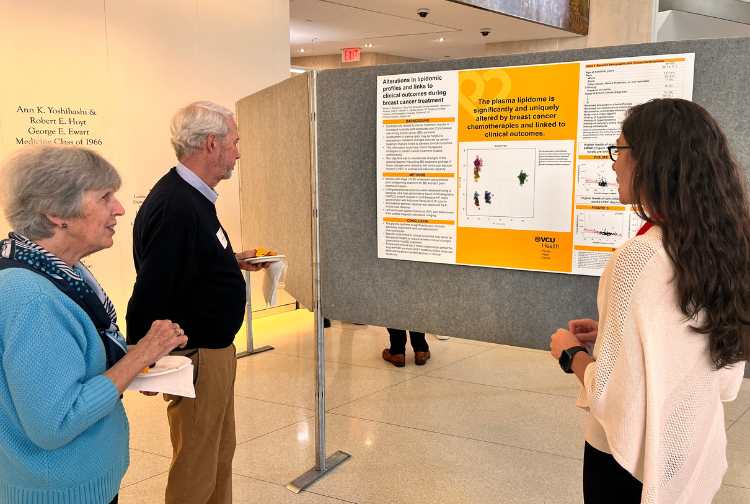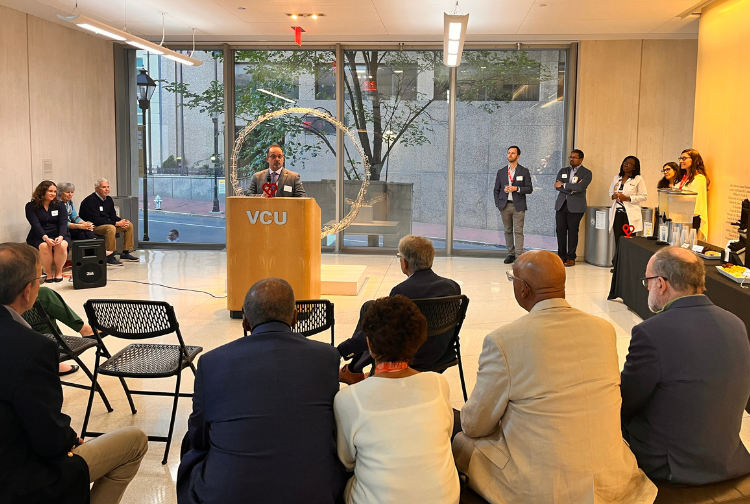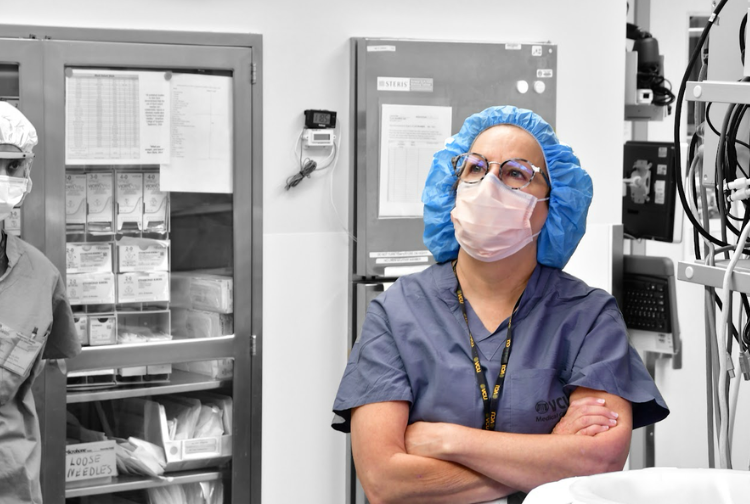Pauley hosts first annual Pauley Pilot Research Symposium
November 17, 2025 Pauley postdoctoral fellow Moriah Bellissimo, PhD discusses her cardio-oncology research with Pauley supporters.
Pauley postdoctoral fellow Moriah Bellissimo, PhD discusses her cardio-oncology research with Pauley supporters.
by Tanner Lambson
The VCU Health Pauley Heart Center’s Pauley Pilot grant program is designed to support and strengthen early-stage cardiovascular research conducted by physicians and scientists working to advance heart health. Launched in 2017 through a gift from Anne and Roger Boevé, the Pauley Pilot program thrives thanks to continued philanthropic support from Pauley Society members and many generous donors.
Pauley Pilot grants provide early-stage investigators with up to $50,000 to pursue innovative cardiovascular research. The goal of the grant program is to give investigators the opportunity to gather enough initial data on their research question or project to allow them to then apply for further, major research grants from the National Institutes of Health, the American Heart Association, and the like.
In October, the Pauley Heart Center held its first-ever Pauley Pilot Symposium, at which current and former grant recipients showcased their research findings. Following remarks by Pauley Heart Center Director Greg Hundley, MD, and Fadi Salloum, PhD, senior associate dean for research at the VCU School of Medicine, pilot researchers held an informal poster session for donors and members of the public. Presenters were:
Pamela Alebna, MD, Pauley T32 Fellow
Alebna is an investigator on the LODOCO STINT trial at VCU, which investigates the safety and efficacy of low-dose colchicine in patients with statin intolerance. Statins are the standard therapy for lowering cholesterol and reducing cardiovascular risk, but one in ten patients experience adverse effects that limit their statin use. This study aims to determine whether colchicine, an anti-inflammatory medication traditionally used to treat gout, can help manage cardiovascular risk in statin-intolerant patients. Alebna’s Pauley Pilot research focuses on assessing how low-dose colchicine affects certain biomarkers within the body that are key indicators of inflammation, which is a major contributor to heart disease.
Moriah Bellissimo, PhD, Pauley postdoc
Bellissimo’s Pauley Pilot Grant project explores the intersection of cardio-oncology and nutrition by studying how chemotherapy affects the hearts of women with breast cancer. Using data from the UPBEAT trial, she is applying lipidomics—a cutting-edge approach to analyzing fatty acids in the blood—to understand how different cancer treatments influence cardiac health. Her ultimate goal is to determine whether tailored diets can protect heart function during treatment, helping survivors maintain independence and overall quality of life after cancer therapy. Bellissimo’s pilot data has helped her to apply for and receive two prestigious grants – a Komen Career Transition Award and a K Award from the National Institutes of Health (NIH) – to support an expanded version of the same research.
Anna Kovilakath, PhD, Pauley T32 fellow
Kovilakath utilized her Pauley Pilot grant funding to conduct a groundbreaking study that identified the enzyme SPTLC3 as a contributor to heart damage following ischemic heart failure. Her research demonstrated that limiting SPTLC3 production in mouse models reduced inflammation and cardiac scarring, findings later confirmed in human cardiac tissue. This work suggests SPTLC3 as a potential therapeutic target for improving outcomes after heart attacks. Motivated by personal loss to cardiovascular disease, Kovilakath focuses on sphingolipid biology to advance understanding and treatment of heart disease.

Senior associate dean for research at the VCU School of Medicine Fadi Salloum, PhD gives opening remarks at the 2025 Pauley Pilot Symposium.
Ajay Pillai, MD, Pauley electrophysiologist
Pillai’s research focuses on improving cardiac efficiency through a novel pacing technique called left bundle branch area pacing (LBBAP). Unlike traditional methods of heart pacing, LBBAP stimulates the left side of the heart first, which has shown promising results in heart rhythms at rest. Pillai aims to investigate how this approach performs under physical stress, such as exercise, where the efficacy of LBBAP is less well understood. Inspired by his grandfather’s struggles with a biventricular pacemaker, Pillai hopes his work will lead to better heart pacing devices that enhance quality of life for patients with rhythm disorders.
Cory Trankle, MD, Pauley cardiac imaging specialist
Trankle’s Pauley Pilot study investigated how left atrial function changes during exercise in patients with atrial fibrillation (AFib) who are scheduled for an ablation, the standard treatment for AFib. This observational project uses a rigorous testing protocol before and after ablation to evaluate whether restoring normal rhythm improves atrial function, exercise capacity, and ultimately reduces heart failure risk. Measuring left atrial function is notoriously difficult with traditional imaging, so Trankle employs exercise cardiac MRI—an innovative technique that captures real-time heart performance under stress. The findings could redefine how clinicians optimize outcomes for AFIb patients undergoing ablation. Trankle used his Pauley Pilot data to apply for and receive an NIH K Award to study the same topic.
If you would like to support the Pauley Pilot Grant program, you can make a gift today here or contact Sarah Neely, Director of Development, at neelysb@vcu.edu to discuss how you can make an impact in research at Pauley.




